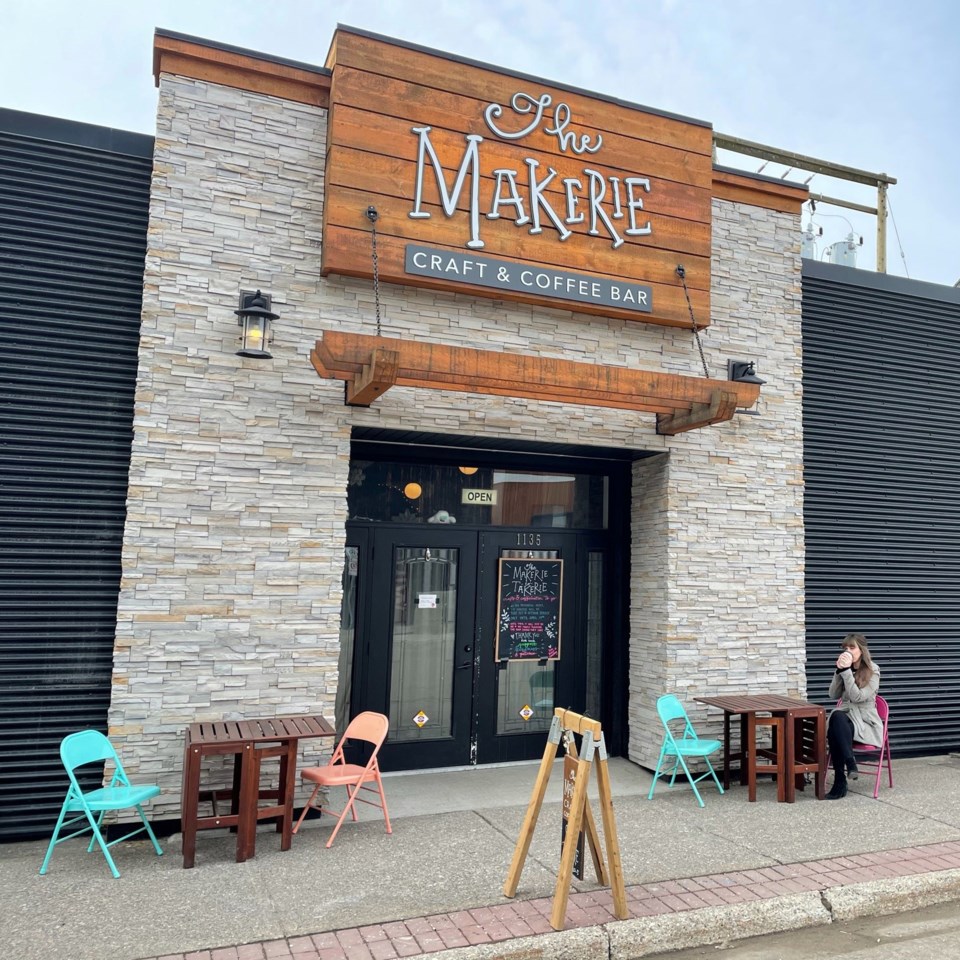The City is giving a break to local restaurants, cafes and pubs that want to set up patios on Prince George streets during the three-week ban on indoor dining.
While they will still need to apply for a permit, the fee doing so will be waived, the City said Wednesday.
They will also still need to provide drawings of what they have in mind and for any works that could disrupt traffic - from vehicles to cyclists to walkers - they will need to provide a plan in accordance with WorkSafeBC.
"These plans will ensure that the safety and accessibility around their patio space will be maintained for all," the City said in a release.
Fees for the permit normally add up to $250 plus $5 for each parking stall that's occupied.
Kim Hayhurst, owner of The Makerie Craft and Coffee Bar at 1135 5th Ave. was an early adopter. Provincial Health Officer Dr. Bonnie Henry announced the ban on Monday and a handful of tables and chairs were out in front of Hayhurst's location by the next morning.
"As soon as they said I could do outdoor seating, I whipped out some chairs outside as fast as we could," Hayhurst said.
Terence Checkley, manager of the Firm Lounge and Grill, said expanding out onto the street is out of the question given its location at 363 George St., but he and his partners want to see if the break will also be given for opening up a rooftop patio.
As it stands, he said the restaurant three servers had to be laid off and is relying on take out and delivery while operating on a skeleton crew.
CrossRoads Brewing general manager Crystal Saur said they will be looking at expanding out onto the street at its 508 George St. spot.
With a patio, along with heaters, already in place, CrossRoads appeared busy during the midday rush on Wednesday, but Saur doubts it will be enough to make up for business lost to the ban.
From as many as 50 employees working various hours, Saur said they're down to five or so kitchen staff while full-timers will probably be reduced to three days per week.
"It's a very somber environment around here, unfortunately," she said.
From a high of 11 employees Hayhurst said she is down to herself with support from her husband and daughter.
"I understand the need for shutdowns and the need for containing things, but myself and I'm sure many other restaurants or anybody in the food service industry is feeling pretty picked on now," she said. " Because we're seeing lots of retail stores and big box businesses that aren't doing the same level of sanitation and contact tracing and flow management and all those kinds of things that our industry has been doing."
Checkley said the ban should have been announced with more advanced notice.
"Rolling it out on the day most restaurants do their big orders for their supplies and then finding out that you aren't able to serve people in the restaurants is sort of unfortunate...you find out you can serve only a 10th of your customers," he said.
Because they're both fledgling businesses - The Makerie opened in September 2020 and The Firm not long after - neither qualify for government support like lease relief. They had to have been operating for 18 months before the pandemic began to provide enough data to show if their revenue had declined as a result of COVID-19.
Saur questioned the need to impose a ban up this way when most of the problem appears to be in the Lower Mainland.
"They should've done what Quebec had done, and segregated certain areas," she said.
Health Minister Adrian Dix said Wednesday that lower case counts in some regions don't discount that “there's risk everywhere in B.C., every health authority.”
“Yes, (infection rates are) significantly worse in Metro Vancouver and in parts of northern B.C., but it's a significant risk everywhere,” Dix said.
B.C. Liberal MLA Todd Stone said the party's caucus does support the idea of regionalizing health restrictions, and if government wants to claim risk is the reason for blanket orders, it should be willing to release more data.
“We think that people deserve to know the case numbers, not just on a regional basis, but they should know those case numbers right down to the communities in each region,” said Stone, MLA for Kamloops-South Thompson and opposition critic for Jobs, Economic Development and Innovation. That would help people adjust and “be better informed in understanding why the measures are there in the first place.”
“We have supported a regional approach for quite some time, a regional approach that can be supported with data,” Stone said.
- with files from Postmedia



